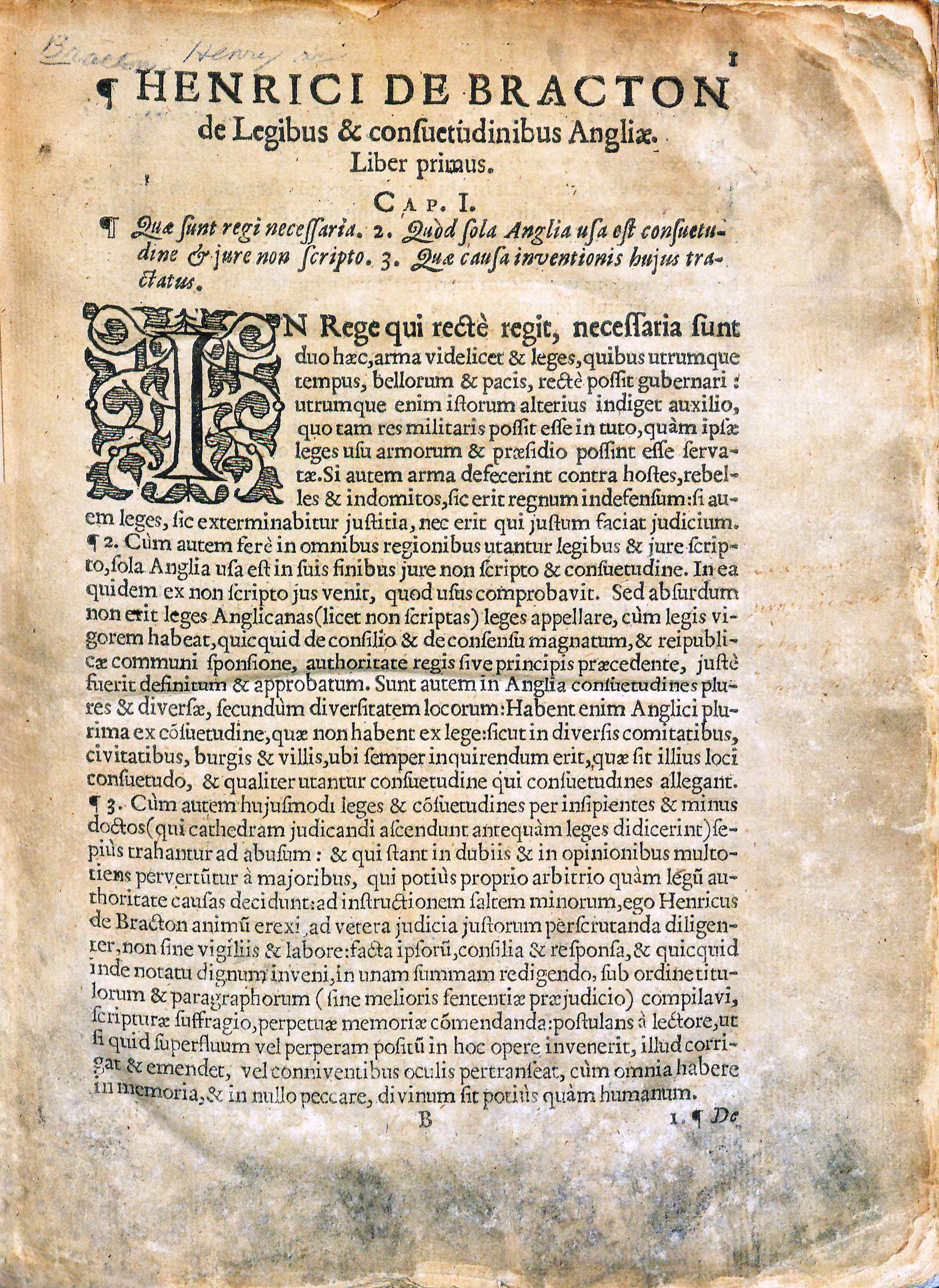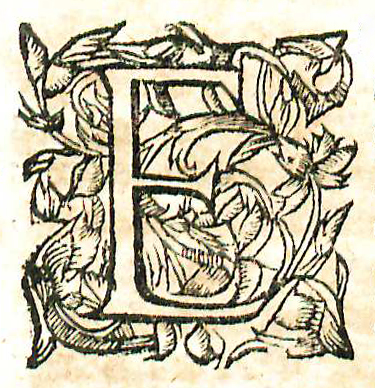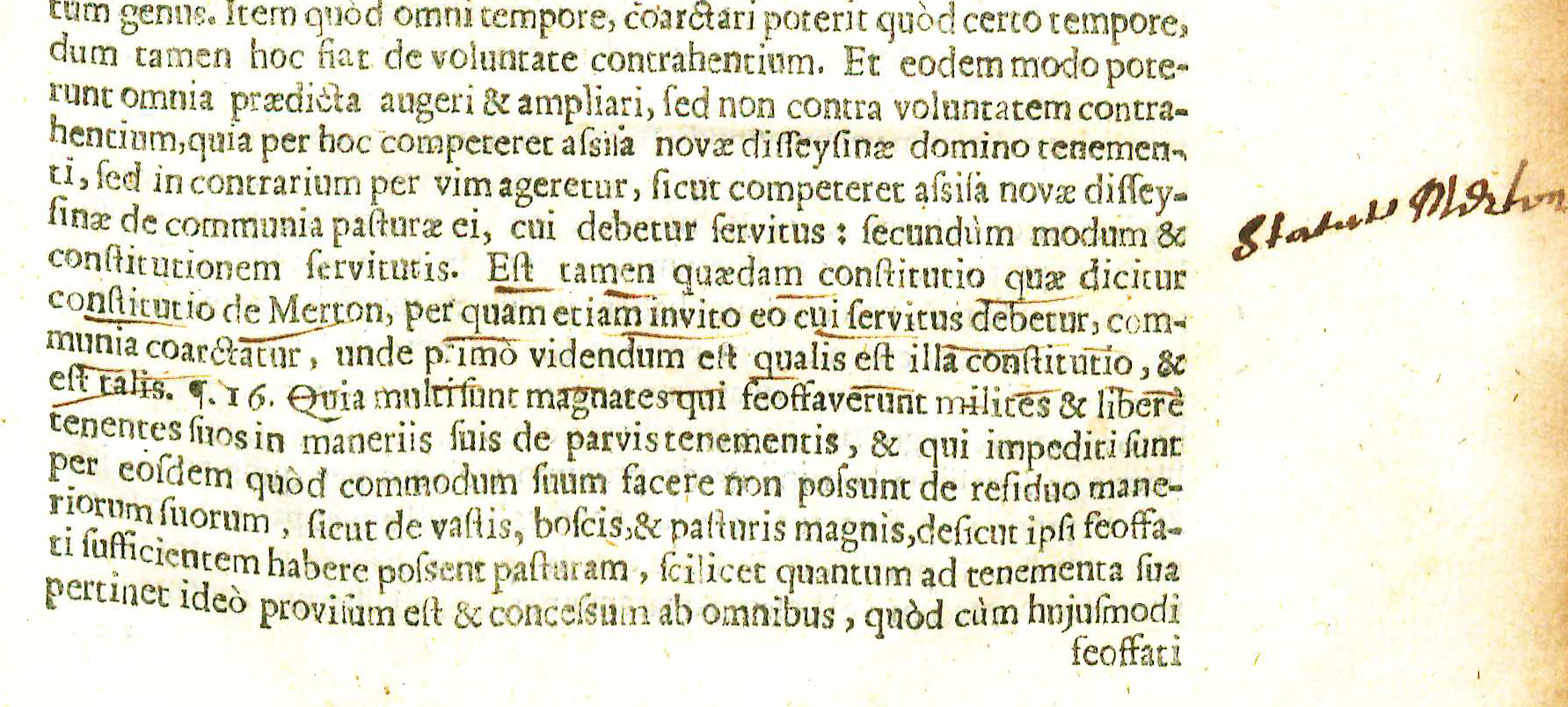Henrici de Bracton De Legibus et Consuetudinibus Angliae Libri Quinque: in Varios Tractatus Distincti, ad Diversorum & Vetustissimorum Codicum Collationem, Ingenti Cura Denuò Typis Vulgati
by Henry de Bracton
| Bracton | |
|
First page of text from Henrici de Bracton De Legibus et Consuetudinibus Angliae, George Wythe Collection, Wolf Law Library, College of William & Mary. | |
| Author | Henry de Bracton |
| Published | Londini: Typis Milonis Flesher & Roberti Young, assign: Johannis More, armig. |
| Date | 1640 |
| Language | Latin |
| Pages | 16, 444 (i. e. 442) |
| Desc. | 4to (23 cm.) |
| Shelf | F-2 |
The treatise he left behind is known alternately as De Legibus et Consuetudinibus Angliae, or simply, Bracton.[6] It consists of hundreds of judicial opinions[7] accompanied by a summary of the common law of the day, primarily in property and the criminal law.[8] De Legibus was pioneering not only for its prodigious length, especially compared with the only other existing English treatise of the time,[9] but also for its foundation in the Roman law even as it articulated something distinctly English.[10] Given the dates of some of the cases and the content of the commentary, it is unlikely that Bracton is the sole author, though his contribution is apparent in later additions to the work.[11]
Evidence for Inclusion in Wythe's Library
Wythe ordered "Bracton" from John Norton & Sons in a letter dated May 29, 1772. Records indicate the order was fulfilled.[12] "Bracton. fol." is also listed in the Jefferson Inventory of Wythe's Library. This was one of the titles kept by Thomas Jefferson. Both George Wythe's Library[13] on LibraryThing and the Brown Bibliography[14] suggest that a copy of the 1569 folio edition of De Legibus et Consuetudinibus Angliae at the University of Virginia might by Wythe's copy, but it has no definitive Wythe markings. Brown also mentions a copy of the 1640 quarto edition Jefferson sold to the Library of Congress in 1815.[15] The Goodwin pamphlet[16] also lists the 1640 edition based on the copy at the Library of Congress. Dean's Memo[17] cites William Edwin Hemphill's dissertation, "George Wythe the Colonial Briton,"[18] as her reason to include the 1640 edition. The Wolf Law Library followed the recommendations of Goodwin and Dean and moved a copy of the 1640 edition from the general rare books collection to the George Wythe Collection.
Description of the Wolf Law Library's copy
Rebound in period style full calf with red and black spine labels. Copy imperfect: lacks title page and all pages preceding first numbered leaf; many pages of index torn and/or missing. Includes marginal annotations in brown ink throughout and a former owner's label, "Robt. Yancey," on spine.
Images of the library's copy of this book are available on Flickr. View the record for this book in William & Mary's online catalog.
See also
References
- ↑ Charles Boothman, "Henry de Bracton" in The Catholic Encyclopedia (New York: Robert Appleton Company, 1907), v.2, accessed October 16, 2013.
- ↑ Ibid.
- ↑ Paul Brand, "Bratton, Henry of (d. 1268)" in Oxford Dictionary of National Biography, accessed October 22, 2013.
- ↑ Ibid.
- ↑ Boothman, "Henry de Bracton."
- ↑ Brand, "Bratton, Henry of."
- ↑ Boothman, "Henry de Bracton."
- ↑ Brand, "Bratton, Henry of."
- ↑ Ibid.
- ↑ Boothman, "Henry de Bracton."
- ↑ Brand, "Bratton, Henry of."
- ↑ Frances Norton Mason, ed., John Norton & Sons, Merchants of London and Virginia: Being the Papers from their Counting House for the Years 1750 to 1795 (Richmond, Virginia: Dietz Press, 1937), 242-243. The letter is endorsed "Virga. 29 May 1772 / George Wythe / Recd. 21 September / Goods Entr. pa. 163/ Ans. the March 1773."
- ↑ LibraryThing, s.v. "Member: George Wythe," accessed on March 5, 2014.
- ↑ Bennie Brown, "The Library of George Wythe of Williamsburg and Richmond," (unpublished manuscript, May, 2012) Microsoft Word file. Earlier edition available at: https://digitalarchive.wm.edu/handle/10288/13433.
- ↑ E. Millicent Sowerby, Catalogue of the Library of Thomas Jefferson, (Washington, D.C.: The Library of Congress, 1952-1959), 2:212-213 [no.1771].
- ↑ Mary R. M. Goodwin, The George Wythe House: Its Furniture and Furnishings (Williamsburg, Virginia: Colonial Williamsburg Foundation Library, 1958), XLVI.
- ↑ Memorandum from Barbara C. Dean, Colonial Williamsburg Found., to Mrs. Stiverson, Colonial Williamsburg Found. (June 16, 1975), 9 (on file at Wolf Law Library, College of William & Mary).
- ↑ William Edwin Hemphill, "George Wythe the Colonial Briton: A Biographical Study of the Pre-Revolutionary Era in Virginia" (PhD diss., University of Virginia, 1937), 123.
External Links
Read this book in Google Books.


